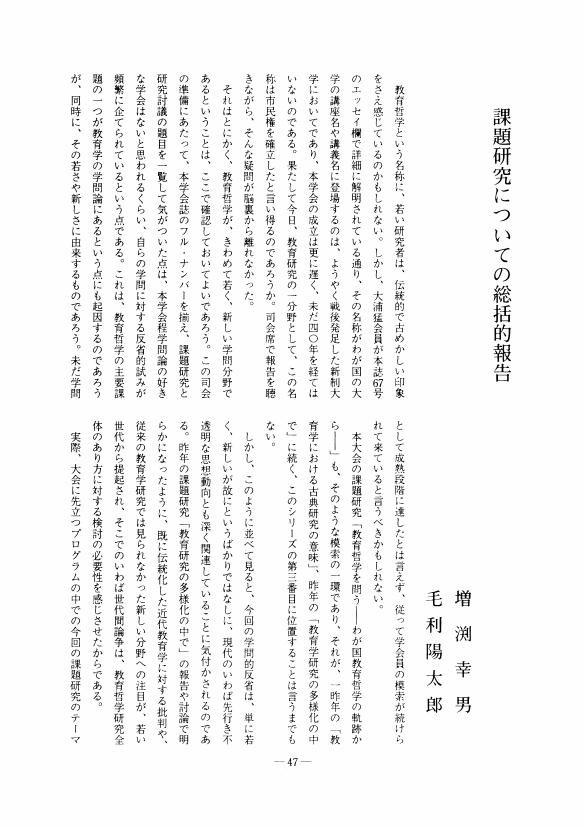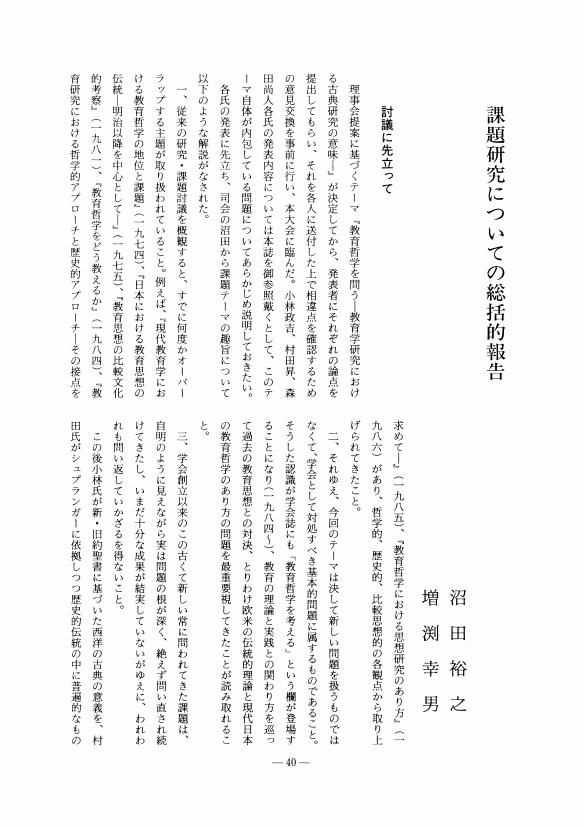- 著者
- 増渕 幸男
- 出版者
- 一般社団法人日本教育学会
- 雑誌
- 教育學研究 (ISSN:03873161)
- 巻号頁・発行日
- vol.77, no.1, pp.90-92, 2010-03-31
1 0 0 0 戦争と教育-教育の責任をめぐって-
- 著者
- 増渕 幸男
- 出版者
- 教育哲学会
- 雑誌
- 教育哲学研究 (ISSN:03873153)
- 巻号頁・発行日
- vol.2005, no.92, pp.22-39, 2005
The twentieth century was a century of war. Despite the passionate longing for peace, and the vigorous efforts of many throughout the world community to attain it, war continues to be a part of the human condition. As political efforts to bring an end to war have had few results, humankind has placed its hopes for a world without war on education, hoping that through education the world can raise generations of peaceloving young people who will oppose war. After the Second World War, the charter of UNESCO clearly set out a road to peace and charged educators with a major role in achieving that goal. In spite of all of our good intentions, however, war continues to plague our contemporary world.<BR>As members of the human race we cannot ignore what seems to be an element of human nature that leads to continuous movements that repeat the cycle of “want-seek-struggle-disorder”. Should we then recognize the potential for evil as a part of human nature? Yes, I believe that evil itself is a part of the essential nature of human beings. That being the case, I would argue that : <BR>1. Education was also implicated in the crime of war, <BR>2. Education plays a role in fomenting war.<BR>Education not only imparts knowledge of the good; it also has taught methods of war. We can see this in the fact that as societies become “more civilized”, they also raise the making of war to new levels. We also must acknowledge the fact that religion is also involved in conflicts between nations, and that many wars take place against the background of religious disagreements. As both religion and education are concerned with the formation of the spirit, the relationship between war and religion is a complex one that education has difficulty resolving.<BR>War is a crime against humanity, and moreover necessarily causes spiritual loss. Education is also caught in a contradiction : opposing violence, and at the same time participating in war. If we cannot resolve the paradox between the two, then how can we call for accountability from education? This paper will consider these complex questions and offer some useful suggestions.
1 0 0 0 OA 戦争と教育-教育の責任をめぐって-
- 著者
- 増渕 幸男
- 出版者
- 教育哲学会
- 雑誌
- 教育哲学研究 (ISSN:03873153)
- 巻号頁・発行日
- vol.2005, no.92, pp.22-39, 2005-11-10 (Released:2009-09-04)
- 参考文献数
- 20
The twentieth century was a century of war. Despite the passionate longing for peace, and the vigorous efforts of many throughout the world community to attain it, war continues to be a part of the human condition. As political efforts to bring an end to war have had few results, humankind has placed its hopes for a world without war on education, hoping that through education the world can raise generations of peaceloving young people who will oppose war. After the Second World War, the charter of UNESCO clearly set out a road to peace and charged educators with a major role in achieving that goal. In spite of all of our good intentions, however, war continues to plague our contemporary world.As members of the human race we cannot ignore what seems to be an element of human nature that leads to continuous movements that repeat the cycle of “want-seek-struggle-disorder”. Should we then recognize the potential for evil as a part of human nature? Yes, I believe that evil itself is a part of the essential nature of human beings. That being the case, I would argue that : 1. Education was also implicated in the crime of war, 2. Education plays a role in fomenting war.Education not only imparts knowledge of the good; it also has taught methods of war. We can see this in the fact that as societies become “more civilized”, they also raise the making of war to new levels. We also must acknowledge the fact that religion is also involved in conflicts between nations, and that many wars take place against the background of religious disagreements. As both religion and education are concerned with the formation of the spirit, the relationship between war and religion is a complex one that education has difficulty resolving.War is a crime against humanity, and moreover necessarily causes spiritual loss. Education is also caught in a contradiction : opposing violence, and at the same time participating in war. If we cannot resolve the paradox between the two, then how can we call for accountability from education? This paper will consider these complex questions and offer some useful suggestions.
1 0 0 0 OA 何のための教育哲学研究だったのか
- 著者
- 増渕 幸男
- 出版者
- 教育哲学会
- 雑誌
- 教育哲学研究 (ISSN:03873153)
- 巻号頁・発行日
- vol.2004, no.89, pp.126-137, 2004-05-10 (Released:2009-09-04)
- 参考文献数
- 8
唐突と思われるかも知れないが、現在の心境として田辺元の『懺悔道としての哲学』を無性に読みたくなり手にした。田辺が論ずる自力と他力の弁証法に引き込まれつつ、やがて理性批判としての哲学の避けがたい運命から帰結する「絶対批判」という言葉に圧倒された。その後、田辺がハイデガーの下で学び、日本の研究者にありがちな西洋の哲学 (者) への盲目的追従ではなくて、徹頭徹尾ハイデガー哲学との対決に心血を注いだことがわかってきた。また、田辺ほど西洋的理性の論理や体系に抵抗した哲学者も少ないであろうが、その評価については西谷啓治の「田辺哲学について」 (著作集第九巻) を読んでいて、見通しがよくなった。そのさい衝撃的であったのは、「理性の立場といふものが根抵のところで破綻に陥る」ところには、「人間の存在にとって種的な基体と呼ばれ得るようなもの、具体的にいへば民族とか国家」の問題が出てくるという「種の論理」の指摘である。さらに、西谷の論稿「田辺先生最晩年の思想」には、田辺の『哲学と詩と宗教』が取り上げられ、田辺がヘルダーリン批判を展開する中で、生の哲学に基づく民族主義的傾向が明らかにされていて、それがハイデガーの重視する民族的土着性への批判を意図していたと教えている。これはドイツロマン主義がナチズムに結びついていったものであるが、ドイツ民族の最深部に隠れていた精神的暗部を、すでに田辺がハイデガーの思想をとおして見抜いていたことでもある。このような文章からエッセイを書き始めたのは、それなりの理由があってのことである。これまで自分が学んできた教育哲学研究の姿勢には、右のようなドイツ哲学との批判的対決がなかったこと、そしてそれ以上に、ドイツ哲学を可能にしている民族精神を問題視してこなかったことへの猛省と自戒の気持ちが、近年頓に強くなっていたからである。はっきり言えば、これまでの自分の研究姿勢は誤っていたのではないかという疑問が出てきたからである。そのきっかけとなったことは、国の内外を問わず、現実世界の混迷状態に対して、自分が教育学研究者としての責任を遂行してきたのかどうかの疑問を抱いたことにある。もちろん、この種の素朴な疑問は誰もが感じていることであろうし、敢えて指摘するまでもないかも知れない。ところが、この二年間に国際社会はテロと戦争・民族紛争を過激なまでにエスカレートさせる方向に進んでいることを真摯に受け止めると、教育現場で人類の平和や共生の大切さを唱えることの無力さが伝わってくる。そこで人類の歴史の教訓とは何か、それを生かすための教育のあり方とは何か、という現実的課題を突きつけられたと言えるであろう。つまり、教育理論は現実が抱えている問題にどこまで踏み込めるかという考察なしには、理論を構想することの虚しさに囚われざるをえないのである。グローバル化、国際的共生社会といったキーワードが飛び交う一方で、テロ、ジハード、拉致問題と失業問題といった言葉が不協和音を奏でている現実がある。こうした現実を直視した時に求められる教育の理論とは、一体どのようなものなのだろうか。右の疑問と向き合ってみて、「ヤスパースとアーレント-ユダヤ人問題にみる公と私の同化問題-」 (「コムニカチオン」第十一号日本ヤスパース協会平・十二年) 「国際化時代の教育の課題-精神的公共性をめぐって-」 (「ソフィア」第五〇巻、第一号平・十三年) 「教育問題としてのグローバリゼーション」 (「ソフィア」第五一巻、第一号平・十四年) を書く中で、現代が一世紀前と同じような世界史の歩みと重なってくる面があることに気づかされたのである。そのことを確認するために取り組んだ一つが、ユダヤ人を地球上から抹殺しようと企てて、人類的罪を犯したナチスのユダヤ人問題である。そこで、この二年間に収集してきた資料を整理してまとめたのが、最近著の『ナチズムと教育-ナチス教育政策の「原風景」-』 (東信堂平・十六年) である。ところが、その取り組みの過程で、先述した田辺元の唱える何かと通底するものを漠然となりとも感じたばかりでなく、これまで自分が取り組んできたドイツ教育学研究のあり方は間違っていたのではないか、という疑問にぶつかったのである。そのことがまた、ナチスの陰謀を阻止できなかったドイツ教育学 (者) に対する疑問へとつながっていった。そうした一連の流れを吐露することになる本エッセイは、これまでの教育哲学研究に対する懺悔道としてのモノローグである。
1 0 0 0 OA 池田全之著『自由の根源的地平-フィヒテ知識学の人間形成論的考察』
- 著者
- 増渕 幸男
- 出版者
- 教育哲学会
- 雑誌
- 教育哲学研究 (ISSN:03873153)
- 巻号頁・発行日
- vol.2004, no.89, pp.159-161, 2004-05-10 (Released:2009-09-04)
1 0 0 0 OA 研究討議に関する総括的報告
- 著者
- 増渕 幸男 森田 尚人
- 出版者
- 教育哲学会
- 雑誌
- 教育哲学研究 (ISSN:03873153)
- 巻号頁・発行日
- vol.2000, no.81, pp.16-21, 2000-05-10 (Released:2009-09-04)
1 0 0 0 OA 課題研究についての総括的報告
- 著者
- 増渕 幸男 毛利 陽太郎
- 出版者
- 教育哲学会
- 雑誌
- 教育哲学研究 (ISSN:03873153)
- 巻号頁・発行日
- vol.1996, no.73, pp.47-50, 1996-05-10 (Released:2009-09-04)
1 0 0 0 OA 課題研究についての総括的報告
- 著者
- 沼田 裕之 増渕 幸男
- 出版者
- 教育哲学会
- 雑誌
- 教育哲学研究 (ISSN:03873153)
- 巻号頁・発行日
- vol.1994, no.69, pp.40-43, 1994-05-10 (Released:2009-09-04)
1 0 0 0 OA 教育関係の原構造 場の論理から
- 著者
- 増渕 幸男
- 出版者
- 教育哲学会
- 雑誌
- 教育哲学研究 (ISSN:03873153)
- 巻号頁・発行日
- vol.1992, no.65, pp.6-11, 1992-05-10 (Released:2009-09-04)
1 0 0 0 OA 教育哲学を考える
- 著者
- 増渕 幸男
- 出版者
- 教育哲学会
- 雑誌
- 教育哲学研究 (ISSN:03873153)
- 巻号頁・発行日
- vol.1986, no.53, pp.90-91, 1986-05-10 (Released:2009-09-04)
1 0 0 0 OA 精神科学の今日的課題を問う
- 著者
- 増渕 幸男
- 出版者
- 教育哲学会
- 雑誌
- 教育哲学研究 (ISSN:03873153)
- 巻号頁・発行日
- vol.1985, no.52, pp.91-95, 1985-11-10 (Released:2009-09-04)
1 0 0 0 IR 「愛燦燦」から学ぶ運命と人生
- 著者
- 増渕 幸男
- 出版者
- 上智大学総合人間科学部教育学科
- 雑誌
- 上智大学教育学論集 (ISSN:02870576)
- 巻号頁・発行日
- no.45, pp.7-13, 2010







